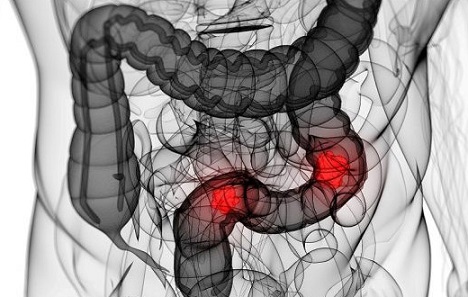Nikhil Prasad Fact checked by:Thailand Medical News Team Jun 23, 2024 1 year, 6 months, 2 weeks, 16 hours, 43 minutes ago
Cancer News: Understanding the Link Between Inflammation and Cancer
Inflammation plays a crucial role in our bodies, often acting as a double-edged sword. While it's part of our body's defense mechanism, chronic inflammation can lead to severe conditions, including cancer. Recent research that is covered in this
Cancer News report, has shed light on how a specific protein, High-Mobility Group Box-1 (HMGB1), impacts mucosal immunity and epithelial differentiation in the context of colitis and colorectal cancer (CRC).
 How a Key Protein: HMGB1 Can Influence Colitis and Colon Cancer Development
The Role of HMGB1 in Colitis and Cancer
How a Key Protein: HMGB1 Can Influence Colitis and Colon Cancer Development
The Role of HMGB1 in Colitis and Cancer
Ulcerative colitis (UC) and Crohn's disease (CD) are inflammatory bowel diseases (IBDs) that increase the risk of developing colorectal cancer. Studies show that the longer a person suffers from IBD, the higher their risk of CRC. Chronic inflammation, a hallmark of IBD, is a key factor in the progression from inflammation to cancer. HMGB1, a protein overexpressed in many cancers, including CRC, has been found to promote cancer cell proliferation, invasion, and metastasis while suppressing the immune response in the gut.
Investigating HMGB1's Impact
Researchers from Nara Medical University-Japan, Tokushukai Nozaki Hospital-Japan and Miyoshi Central Hospital-Japan used various models to understand HMGB1's role better:
-Mouse Models: Two types of mouse models were used - one induced with azoxymethane (AOM) to study colon carcinogenesis, and another with dextran sulfate sodium (DSS) to study colitis-associated cancer. Both models showed increased levels of HMGB1 and changes in immune cell behavior and epithelial differentiation.
-Human Tissue Samples: Samples from patients with UC-related CRC were analyzed to see how HMGB1 levels correlated with disease progression. The findings were consistent with the mouse models, showing increased HMGB1 levels and a decrease in the differentiation of mucosal epithelial cells.
Key Findings from the Research
-Changes in Immune Cells
The study revealed significant changes in CD8+ T cells, a type of immune cell crucial for fighting infections and cancer cells. In early stages of colitis, activated CD8+ cells increased, indicating a strong immune response. However, as the disease progressed towards cancer, these cells became "exhausted," losing their ability to fight effectively. This exhaustion was marked by increased levels of a protein called PDL1 on CD8+ cells.
-Energy Metabolism Shift
HMGB1 also caused a shift in energy production within these cells. Normally, CD8+ cells rely on a process called oxidative phosphorylation (OXPHOS) for energy. However, with increased HMGB1 levels, these cells switched to glycolysis, a less efficient form of energy production that contributes to their exhausti
on and dysfunction.
-Effects on Epithelial Cells
The intestinal epithelial cells, which form the lining of the gut, were also affected by HMGB1. The protein reduced their ability to differentiate properly, meaning they couldn't mature into fully functional cells. This reduction in differentiation was associated with an increase in cell proliferation and a decrease in the production of important antimicrobial peptides that help maintain a healthy gut microbiome.
The Broader Implications of HMGB1
-Impact on the Gut Microbiome
The gut microbiome, consisting of trillions of bacteria and other microorganisms, plays a vital role in maintaining gut health and overall well-being. HMGB1 has been found to cause dysbiosis, an imbalance in the gut microbiota. This imbalance can lead to increased inflammation and further complicate conditions like UC and CRC. Healthy gut flora helps protect against pathogens and supports immune function. When HMGB1 disrupts this balance, it weakens the gut's defenses, allowing harmful bacteria to thrive and contribute to disease progression.
-HMGB1 and Chronic Inflammation
Chronic inflammation is a persistent issue in IBD patients and a significant factor in the transition from UC to CRC. HMGB1 exacerbates this inflammation by promoting the release of inflammatory cytokines. These cytokines not only damage the gut lining but also create an environment conducive to cancer cell growth. By understanding how HMGB1 contributes to this chronic inflammation, researchers can develop targeted therapies to mitigate its effects.
Potential Therapeutic Approaches
The research suggests that targeting HMGB1 could be a promising strategy for treating UC and preventing the transition to CRC. By neutralizing HMGB1, it might be possible to restore proper immune function and epithelial cell differentiation, thereby reducing the risk of cancer development.
-Anti-HMGB1 Antibodies
One potential approach is the use of anti-HMGB1 antibodies. These antibodies can bind to HMGB1, preventing it from interacting with its receptors on immune and epithelial cells. In mouse models, treatment with anti-HMGB1 antibodies reduced inflammation and improved gut health, indicating a potential therapeutic pathway for humans.
-Diet and Lifestyle Interventions
Diet and lifestyle also play crucial roles in managing inflammation and maintaining a healthy gut microbiome. Incorporating anti-inflammatory foods, probiotics, and prebiotics can help support gut health. Regular exercise and stress management techniques are also beneficial, as stress can exacerbate inflammation and disrupt the gut microbiome.
Future Research Directions
While this study has provided valuable insights, there are still many questions to answer. Future research should explore the effects of HMGB1 on other types of immune cells and investigate how changes in the gut microbiome contribute to disease progression. Additionally, understanding the role of HMGB1 in different sexes and age groups could lead to more personalized treatment approaches.
Conclusion
The study of HMGB1 in the context of UC and CRC highlights the complex interplay between chronic inflammation and cancer development. By unraveling these mechanisms, scientists are paving the way for new therapeutic strategies that could significantly improve the lives of those suffering from these debilitating conditions. Targeting HMGB1 offers a promising avenue for reducing inflammation, restoring immune function, and preventing cancer progression, ultimately contributing to better health outcomes for patients with IBD.
The study findings were published in the peer reviewed International Journal of Molecular Sciences.
https://www.mdpi.com/1422-0067/25/13/6846
For the latest
Cancer News, keep on logging to Thailand Medical News.
Read Also:
https://www.thailandmedical.news/news/scientists-confirm-correlation-between-colitis-and-colon-cancer
https://www.thailandmedical.news/news/common-oral-bacteria-linked-to-colon-cancer
https://www.thailandmedical.news/news/smad4-clue-to-colon-cancer
